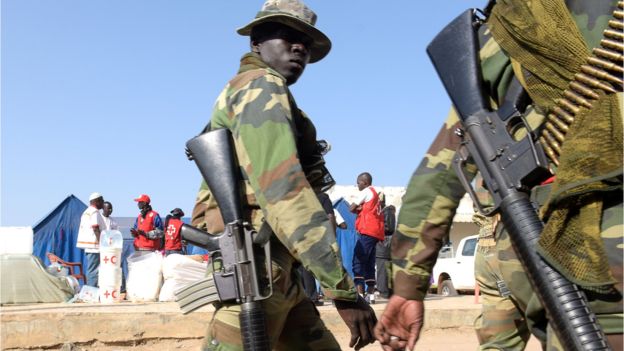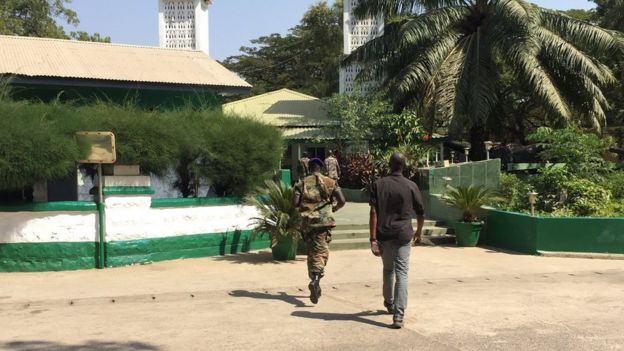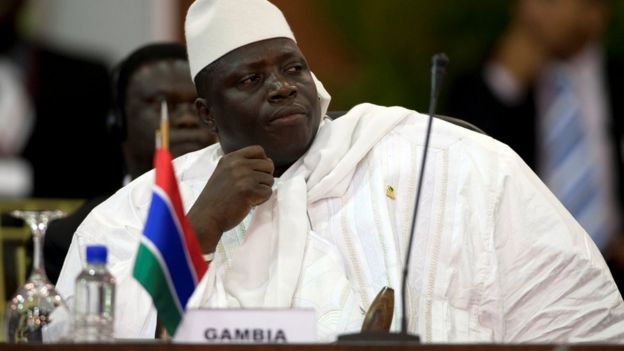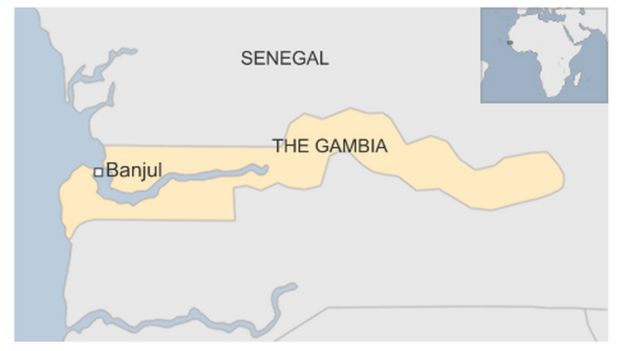
A deadline for defeated President Yahya Jammeh of The Gambia to leave office or be forced out by UN-backed forces at 16:00 GMT has expired with no news.
The earlier deadline of noon passed as the Guinean and Mauritanian presidents arrived in Banjul for last-ditch talks. There has been no statement from them.
Mr Jammeh’s elected successor, Adama Barrow, was sworn in as president at a ceremony in Senegal on Thursday.
Troops acting in support of President Barrow have paused their advance.
The forces from the Economic Community of West African States (Ecowas) regional grouping are backed by the United Nations.
They crossed into The Gambia from Senegal on Thursday but have been told not to advance further until the talks have finished.
Mr Barrow’s legitimacy as president has been recognised internationally, after he won last month’s elections.
Mr Jammeh remains at the state house in The Gambia’s capital, where soldiers are calm, the BBC’s Umaru Fofana reports.
The head of the Gambian army, Gen Ousman Badjie, told Reuters that he now recognises Mr Barrow as commander-in-chief.

Mr Jammeh’s term expired at midnight on Wednesday – but, while still president, he engineered a parliamentary vote to extend his presidency. As Mr Barrow has already been sworn in, the country could be said to have two presidents.
Guinea’s President Alpha Conde and Mauritanian President Mohamed Ould Abdel Aziz arrived in Banjul on Friday morning for the talks with Mr Jammeh.
The chairman of the Ecowas commission, Marcel Alain de Souza, said that if the meeting with Mr Conde proved unsuccessful, military action would follow.
Break for prayers: By Umaru Fofana, BBC Africa, Banjul

With talks still ongoing between Yahya Jammeh and the visiting presidents of Guinea and Mauritania, I have been waiting at State House, the seat of the presidency.
When it was time for Friday prayers and as there was no sign of progress I went to the Chairman Jammeh Mosque inside the grounds of State House.
The soldiers were great. They welcomed me there and looked pleased to know I was a practising Muslim.
Imam Alhaji Jallow was preaching about faith and following the right path. An interesting theme if you ask me, in view of the times.
Midway through the sermon, we were asked to leave the four front rows. We shifted.
As the sermon proceeded I was called outside the mosque. Confused, I asked why. No answers. My colleague and I were driven out of State House. Very respectfully I must say.
As we left, a member of the presidential guard whispered to me the obvious: Mr Jammeh and his guests would be coming to the mosque for prayers.
They were perhaps worried that I would get an insight into how the talks were going if I remained.
Ecowas said that its forces had encountered no resistance after entering The Gambia.
The troops are from Senegal and other West African countries.
Mr Barrow, who remains in Senegal, has said that he will not return to Gambia’s capital, Banjul, until the military operation has ended.The threat by the West African regional bloc Ecowas to remove Mr Jammeh by force is supported by the 15-member UN Security Council, although the council has stressed that a political solution should be the priority.
A Senegalese army spokesman, Col Abdou Ndiaye, told the BBC that troops who were now in The Gambia were prepared to fight if necessary.
“It is already war, if we find any resistance, we will fight it,” he said, adding: “If there are people who are fighting for the former president, we will fight them.”
But Col Ndiaye said the main goal of Ecowas was to restore democracy and to allow the newly-elected president to take power.
Tourists have been evacuated from The Gambia and the UK’s Foreign Office has advised against all but essential travel to the West African country.
A Senegalese army spokesman, Col Abdou Ndiaye, told the BBC that troops who were now in The Gambia were prepared to fight if necessary.
“It is already war, if we find any resistance, we will fight it,” he said, adding: “If there are people who are fighting for the former president, we will fight them.”
But Col Ndiaye said the main goal of Ecowas was to restore democracy and to allow the newly-elected president to take power.
Tourists have been evacuated from The Gambia and the UK’s Foreign Office has advised against all but essential travel to the West African country.
Why is Mr Jammeh refusing to go?

After first accepting defeat in the election he reversed his position and said he would not step down. He declared a 90-day state of emergency, blaming irregularities in the electoral process.
The electoral commission accepted that some of its early results had contained errors but said they would not have affected Mr Barrow’s win.
Mr Jammeh has said he will stay in office until new elections are held.
Remaining in power would also give him protection against prosecution for alleged abuses committed during his rule.

Source: BBC

